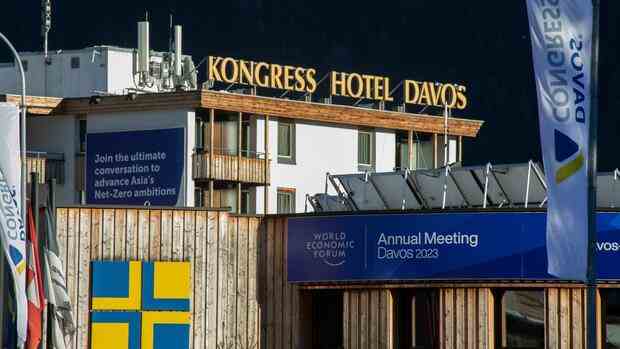Dusseldorf After two years of the pandemic, the annual meeting of the World Economic Forum will take place again in January and again in Davos. 2500 decision-makers from all over the world will discuss the challenges of the coming months.
“The meeting takes place at a time when the world is facing a multitude of crises, which only increases the need for dialogue,” emphasize the organizers of the World Economic Forum (WEF) around President Borge Brende, the former foreign minister of Norway was, and WEF founder Klaus Schwab.
“Cooperation in a fragmented world” is the main theme of the conference, which will take place from January 16th to 20th.
Again and again there was criticism of the World Economic Meeting, which critics describe as an elitist gathering. Nevertheless, the meeting in Davos in its traditional form could build on old successes, believes Sandra Navidi, founder of the New York analysis house Beyond Global: “The bigger the crises, the greater the need for events that bring forward thinkers and decision-makers together.”
Top jobs of the day
Find the best jobs now and
be notified by email.
These are the most important topics:
Geopolitics: The great disunity
On Tuesday morning, Caixin Global executive Li Xin, Hong Kong stock exchange chief Nicolas Aguzin, London economist Keyu Jin and former Australian Prime Minister Kevin Rudd discussed “The next China chapter“.
Tuesday afternoon, forum boss Borge Brende discussed the geopolitical turmoil with Democratic US Senator Christopher Coons, Saudi Foreign Minister Prince Faisal bin Farhan al Saud, Deputy Prime Minister of Qatar Mohammed bin Abdulrahman Al Thani and Finnish Foreign Minister Pekka Haavisto.
The geopolitical implications for industry On Tuesday morning, Fidelity CEO Anne Richards, EY boss Carmine di Sibio, Ola‧yan boss Lubna Olayan and Umicore boss Mathias Miedreich will discuss.
>>Read also: US star economist Nouriel Roubini: “The mother of all debt crises”
Also on Tuesday morning, Politico boss Matthew Kaminski discussed how things are going Europe’s defense stands. The panel will include Polish President Andrzej Duda, Lithuanian President Gitanas Nauséda and Macedonian President Stevo Pendarovski.
Also Ukrainian President Volodymyr Zelensky has agreed to participate. According to media reports, he also wants to talk to entrepreneurs and investors about the development of the country.
Global economy: Fear of de-globalization
On Tuesday morning, economist Adam Tooze, Oxford researcher Ngaire Woods, Stanford historian Niall Ferguson and Hungarian Foreign Minister Péter Szijjártó ask whether the world is facing a de- or re-globalization stands.
Bloomberg journalist Stephanie Flanders asked her fellow panellists on Wednesday morning whether a ticking time bomb the world economy threatened to disturb. Gita Gopinath, Director General of the International Monetary Fund, EU Economic Commissioner Paolo Gentiloni and the former head of the Indian central bank, Raghuram Rajan, will discuss with her.
Christine Lagarde, head of the European Central Bank (ECB), and Kristalina Georgieva, head of the International Monetary Fund, discuss the global economic outlook for this year on Friday and ask: “Is this the end of an era?
where does … come from the future growth and what steps does politics need to take to stabilize the global economy? Bankers such as JP Morgan CEO Jamie Dimon, Deutsche Bank boss Christian Sewing and Citigroup boss Jane Fraser will also discuss these questions.
Climate protection: Opportunities for decarbonization
“Decarbonization: An insurmountable challenge?” asked ex-US Vice President Al Gore, Ronald Wuijster, head of asset manager APG, management professor Mauricio Cárdenas, Swiss Re boss Christian Mumenthaler and Odile Renaud-Basso, president of the European Bank for Reconstruction, on Tuesday morning.
On Wednesday afternoon, the participants will deal with sustainable batteries as the basis for the green transformation.
Technology: Off to a better future?
On Tuesday morning, ETH Zurich and other Swiss research institutions will provide information on the current state of affairs quantum computers.
Then on Wednesday afternoon, Carlyle’s chairman interviewed David Rubenstein Palantir– Boss Alex Karp.
And Wednesday afternoon, Cathy Li talks about the future of the metaverse with Meta product boss Chris Cox, HP CEO Enrique Lores and the Rwandan Minister of Technology Paula Ingabire.
More: Battle for the New World Order – How democracy is making a comeback
